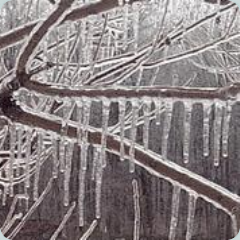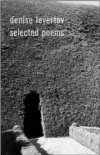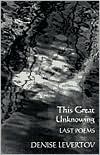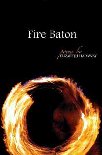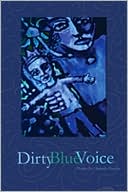Winter 2007
Table of Contents - Vol. III, No. 4
Poetry Essays Fiction Book Reviews
Denise Levertov,
Selected Poems, edited by Paul A. Lacey, preface by Robert Creeley, New Directions Publishing,
Softcover, ISBN 0-8112-1554-7, 220 pp., $14.95.
Denise Levertov,
The Great Unknowing: Last Poems, New Directions Publishing,
Softcover, ISBN-13: 978-0811214582, 80 pp., $9.95.
Denise Levertov, who died at age 74 on December 20, 1997, was a major American poet, albeit British born, in Ilford, Essex, England, of an Eastern European Jewish father and a Welsh mother in 1923. At her death, she left in a notebook 40 completed poems and those are the pieces which are included in This Great Unknowing: Last Poems. Ms. Levertov’s poetry was both simple in its presentation and ideas and profound in its thought-provoking nature, befitting a poet whose touching on metaphysical themes has been likened to T. S. Eliot. Thus the covers of the two books, for the selected verse, a keyhole-like hole in a hedge and, for the volume of last poems, the reflections on a river, provide perfect graphics for the type of works she wrote—deceptively simple but that nonetheless plumb depths of philosophy and insight. At her best, her works provoke that “Ah, yes” sigh that good poetry asks of us. Look at this poem from her final collection and appreciate its simplicity and deft construction, reminiscent of Oriental forms such as haiku or the subtlety of a cinquain:
Mid-DecemberWestering sun a mist of gold
between solemnities of crowded vertical
poplar twigs. The mountain’s
western slope is touched
weightlessly with what will be, soon,
the afterglow.
Levertov studied with Paterson, New Jersey physician and poet William Carlos Williams and the influence of the simplicity of his verse is evident in much of her work. The following longer Levertov poem also demonstrates the spirituality found in many of her poems:
The FountainDon’t say, don’t say there is no water
to solace the dryness at our hearts.
I have seen
the fountain springing out of the rock wall
and you drinking there. And I too
before your eyes
found footholds and climbed
to drink the cool water.
The woman of that place, shading her eyes,
frowned as she watched—but not because
she grudged the water,
only because she was waiting
to see we drank our fill and were
refreshed.
Don’t say, don’t say there is no water.
That fountain is there among its scalloped
green and gray stones,
it is still there and always there
with its quiet song and strange power
to spring in us,
up and out through the rock.
Or appreciate the following example, from Levertov’s Selected Poems:
The SecretTwo girls discover
the secret of life
in a sudden line of
poetry.
I who don’t know the
secret wrote
the line. They
told me
(through a third person)
they had found it
but not what it was
not even
what line it was. No doubt
by now, more than a week
later, they have forgotten
the secret,
the line, the name of
the poem. I love them
for finding what
I can’t find,
and for loving me
for the line I wrote,
and for forgetting it
so that
a thousand times, till death
finds them, they may
discover it again, in other
lines
in other
happenings. And for
wanting to know it,
for
assuming there is
such a secret, yes,
for that
most of all.
Denise Levertov left this earth a decade ago but her poems live on to inspire and delight new generations. Check these books out if you don’t know her work. It should be mentioned that seven poems from This Great Unknowing: Last Poems, that is, around a sixth of the forty poems in her final book, also appear in the Selected Poems but still both books are worth getting despite this duplication. It might also be mentioned that although there is for Levertov from publisher New Directions, a Collected Early Poems, 1940–1960, a Poems 1960–1967, and a Poems 1968–1972, etc., there has yet to appear a complete collected poems for this poet. Is New Directions reading this? I hope so, because a collected volume of poetry by this significant voice will be something worthwhile to acquire whenever it is published.
Elizabeth Hadaway, Fire Baton, The University of Arkansas Press, ISBN-13: 978-1557288240, 80 pages, 2006, $16.00.
Virginia-born, though now Kingsville, Maryland native Elizabeth Hadaway is characterized on the inside cover of this first collection as “a cross between Yeats and a seasoned moonshiner”—which I think well characterizes the nature of her poetry: verse from southern roots qualified by European and other influences, lending her southern witty and visceral verse a classic sheen. That wording describing her that I just quoted indeed comes from one of her own fine and ingenious poems which perhaps shows the poet’s lingering affection for but also inevitable alienation from her southern background:
Was You Born Here?“Cause you don’t talk like you
was born here,” said
my probable fourth cousin,
at least an eighth. “Coarse-bred,”
Yeats called Cockney Keats. What
he’d think of me I know.
I’m talking American Viscose,
Magic City Mortgage Co.
among my parentage.
But marry that
to old moonshiners who read Cicero.
In nothing flat—
in rounded mountains, knobs
where where’s whirr, peaks
of laurel burning into bloom—
I start to speak,
sound like a stranger everywhirr.
The Cure taught me Camus
and still the flatland bouncer asks,
“You’re from somewhere, aren’t you?”
There is some clever inventiveness in Hadaway’s poetry as well, as in the following piece, called “An Essay in Criticism” which takes a wry poke at T. S. Eliot and one of that poet’s influences, Argentine-born poet and fabulist Jules Laforgue, who died in Paris in 1887 and who was a poetic influence also on Ezra Pound:
T. Eliot and J. Laforgueawoke one midnight in the morgue
on their adjoining slabs. Jules brushed
his evening jacket, stuck a crushed
carnation through his buttonhole
to honor his immortal soul,
then buffed the polish of a shoe
and took the stairs up, two by two,
till he was out and on the street.
Tom curled up tightly in his sheet.
Jules busked until he made enough
to buy a never-ending cup
of coffee at the Horn of Plenty Grill,
that worn utopia. No chill
could reach the heart-carved table he
shared till dawn with Leah Lee
and cream and sugar on the side.
Tom coiled in like a trombone slide.
The sun reared up, but Jules refused
to crumble like a vampire who’s
shriveled at the touch of light.
Tom clamped his hands and prayed for the night.
Playful, provocative and entertaining, Elizabeth Hadaway is a poet worth reading, particularly for the cleverness of another poem in this collection, “A Refusal to Mourn the Death, by Car, of Dale Earnhardt, at Daytona.” The poem, a bit too long to adequately quote here, includes the poignant observation about “a memorial T-shirt” with “his face folded, half / in love with asphalt death.”
S. Thomas Summers, Rather, It Should Shine, Pudding House Chapbook Series, ISBN 1-58998-544-3, 36 pages, 2007, $10.00.
New Jersey native S. Thomas Summers, by profession a high school English teacher, never fails to bring a fresh eye to the scenes about him, whether it be in his kitchen with his wife and child or in the woods or out on the highway. The scenarios in this, his second chapbook, are simple and straightforward, but the poet always manages to extract drama and meaning. An example is the following poem:
BreakfastSaturday morning: a white
ceramic bowl wet
with a shallow puddle
of milk where a single
Cheerio floats like an inner
tube. My belly is full. The boy
across the street tosses
a baseball into the air, catches
it with a newly oiled mitt—
the leather still damp and dark.
This next poem ostensibly features the writer, in his mind, addressing poet W. S. Merwin and regretting that he was unable to read some of Mr. Merwin’s poetry, although cleverly he contrives to construct his own fine poem out of that seemingly regrettable situation!
With Apologies to Mr. MerwinI meant to spend some time
with you this evening, page by page,
sifting for a nugget I could stash
in my pocket, a metaphor I could
roll between my fingers, but July
has settled heavy under the trees
and this chardonnay—so sweet and cold.
A warbler flits over the backyard
grass. A yellow-jacket hovers above
my wine, contemplates a swim. Darkness
cradles itself in a pine near the splintered
fence as night slips into cool silks.
Forgive me— I shall not read a word.
Profundity is found by Scott Summers in simple almost primeval situations. He is not afraid to mix in Death as a real-life characer with domestic things such as porch swings or coffee mugs:
Last CupEven Death understands—
patiently waits on the porch swing,
gently sways back and forth.
He whistles a pleasant song.
His sickle blade reaches
over the railing, licks
itchy shrubs like a silver tongue.
I sip the final drops
of life from my mug, wonder
if you’d prefer a note
or a call when I got there.
Quiet and unassuming in much of his verse, S. Thomas Summers nonetheless takes us along as if he is taking us for a drive in a rusty old pickup truck. We cannot but be charmed by the ride.
Clarinda Harriss, Dirty Blue Voice, Half Moon Editions, ISBN-13: 978-0979425202, 42 pages, 2007, $10.00.
As readers may gather from the essay by Dave Eberhardt and Dan Cuddy on the Baltimore poetry scene in this issue of Loch Raven Review, Clarinda Harris is regarded as the doyenne, den mother, even soccer mom for Baltimore poets. I have personally known Clarinda since 1972 when she came to give a reading at the College of Notre Dame in Baltimore where I was studying with Sister Maura Eichner, herself a fine poet. And, cards on the table, in the interests of full disclosure, in 1981, Clarinda’s Chestnut Hills Press, a subsidiary of the New Poets Series that she then ran and edited, published First, The Dream, poems by myself and two other Baltimore poets, Barbara R. Mandell and James R. McCready, with an introduction written by her. Thus it came to me as somewhat of a surprise, nay a shock, to read the edgy and even profane fare that she has published in this book—the following excerpts, from At the Bone & Worm Inn: For a Young Lover, being a representative sample:
At the Bone & Worm Inn, which is our coy termfor wherever there is a horizontal surface, we’re able
to fuck on—loveseat, deck, piano bench (how come
we haven’t doggy-styled it on the kitchen table?)—
everything’s a little dirty, a little shabby, from
the oriental rug beneath your knees or mine
to how we hide our plans in labored puns,
a silly code to fool the email censors....
Only I can’t help thinking sometimes, when
you’re not around, or after you’ve gone home,
of what your body’s soft parts, ass & abdomen,
balls & cock & downy skin, all devoid of bone
even at their hardest—tender parts that soon-
est fall to rot. Sometimes, sleeping alone
at the Bone & Worm Inn, ...
It’s important to note that Clarinda does not employ profanity merely to shock but instead uses it to explore ideas about life and love just as she does in her more conventional and less profane verse. The poems in Dirty Blue Voice are written in the voices of various women, so Clarinda has said. It’s interesting to note that so many of the poems have to do with mortality, like the above example or the next excerpt, part III of Dirty Old Woman entitled “Some Jobs Are Not For Dirty Old Women.” And no doubt the fascination with mortality and aging is because the poet, a long-time English professor at Towson State University in Maryland, is herself aging.
They must not teach.Classrooms fill with body parts, bellies, butts,
like serial kill—
or cook—all those
ribs, breasts, thighs! The sweaty, hairy globes
of ripe tomatoes!
Clean houses? No.
too many mirrors and drawers bulging with
lacies to try on.
The nunnery?
Yes! hours to turn lids low, meditating,
Gazed fixed fast down here.
Clarinda Harriss’s poems are, as ever, vivid, sensuous, and adventurous. And so Dirty Blue Voice, although some might find it, yes, blue, and, er, shocking—but I hope not offensive—is highly recommended. I will end by giving one other example of a work in the book, the complete poem, “Cartesian Lips”:
Of course your body hates you.So does mine. So would any living thing
a squirmy pulp lives inside of
like a tongue in somebody else’s mouth.
You have to respect the body’s many
revenges against the spineless spirit,
most subtly the mouth and the secrets
it blabs without a word.
Yesterday I saw a nun in her coffin
shown up a bitter bawd
by a twist of her painted-shut lips.
Today, as it zoomed in for a kiss,
I saw your mouth in its rasp of whiskers
whisper “Don’t trust him” while mine,
lust-swollen, fat as a slug, mumbled
“She always was a sucker and fool.”
Manorborn, Volume 5, No. 1, September 2007, edited by Silvia Grasham, Jean E. Keenan, and Alan C. Reese, Abecedarian Books, ISBN 978-0-9791401-5-0, 75 pages, $14.99.
Gathered in the latest edition of Manorborn, the annual anthology of the Harford Poetry and Literary Society, is a rich compendium of works by 49 poets and short fiction writers both well known and not so known from Maryland and elsewhere. One nationally recognized writer is Annapolis-based Grace Cavalieri and also included are well-published fiction writers R. A. Propper, Phylis Warady, and Mary Zelinka. Among the Baltimore area writers represented are Dan Cuddy, Loch Raven Review co-editor Jim Doss, Clarinda Harriss, Rosemary Klein, and Michael North. As might be expected from this Harford publication, represented also are veteran Harford poets such as Betty Grabarek, Jean E. Keenan, and Alan C. Reese, who help to round out a varied and worthwhile collection of works by talented wordsmiths.
Mr. Reese, besides being one of the editors and a leader of the Harford organization, is the owner of Abecedarian Books, the publisher of Manorborn. With an attractive, slick color cover featuring a sunset photographed by Leslie F. Miller and a sprinkling of black and white illustrations within the text, this represents another worthwhile literary offering from the publishing house. Given the range of writers represented, the issue contains enough to delight, entertain, and provoke deep thoughts from anyone who loves good writing. Witness the following spunky poem by Stacy Schapiro that opens the book:
Poetry’s ConfessionPoetry does not want to be quiet;
silent and simple in black type.
Scream your poetry!
Dance it, feel it
between your fingers.
Run with it, carry it
with you under your skin.
Smell it! Is it sweet or tart
between words?
Does it speak to you?
Poetry is not calm and sedated.
Animator of all things,
guardian of history;
holder of hearts.
Poetry moves through molecules
molds meaning in the mundane.
Don’t leave it soundless in the dark.
After the confrontational call to appreciate poetry issued by Ms. Schapiro, we find on another plane entirely this seductive yet sinister poem by Constantine Pantazonis:
VampyrLike a dream in a shroud of darkness,
I am confined and bound;
the residue of secrets
lost in the mist of ancient haunts.
The cobblestones, sweaty and dank,
footprints, forgotten
silent...mute...
pallbearers descend—
survivors of the plague, but
dead nonetheless...
and I know that I shall never know
the name of tomorrow’s victim,
face pink—blood rich,
I suckle and kiss with the wildest abandon
seasoned with the salt of their tears.
Replete and replenished,
I live through their eyes—
their foolish expectations,
their infant tears, pursue me
like a dream in a shroud of darkness.
Then there’s this thoughtful poem by Grace Cavalieri:
Water on the Sunfor Candace Katz
We both knew it,
that every mother has the same child,
and so every loss is the same loss.
There had been no music before them.
well not exactly the same music we’d known.
soon it started up, singing a little song that went like this:
“inside every hello is a goodbye”
then the music went right on just as if nothing had ever happened.
We said their names over and over until they had no sound.
Before that, before we knew them, we had felt safe.
Do you remember? Ever feeling safe?
They arrived, and grew, and turned away,
and when they turned back
everything was changed.
We always knew it was coming,
from the first time their bones were claimed and named,
formed and polished, inside us, even then we knew.
They arrived wearing their bodies lightly on them,
with their entire lives lying in wait to tell
what would be known about them.
The minute they were born—that second—
that’s when we took their faces for our own,
while underneath, did you realize—as I did—
that underneath the ice the great swimming was already
underway, away, even before this story began.
Cavalieri’s poem has a timeless, haunting quality. This reviewer does though wonder about the unconventional lack of capitalization of the opening letter of the sentences, “well not exactly the same music we’d known” and “soon it started up, singing a little song that went like this: . . .” Is that how the poet intended the poem to appear or are those typos, when we consider that all other sentences begin with a conventional upper case letter?
Another thing that goes to the way the whole book is put together and that is obviously an editorial or publisher decision is that the name of the author of each piece of writing is not given at the beginning or below the work but at the base of the page, with the page numbers—that is, in the footers, as we editors term it. This is a different style to that employed in the earlier issue, Poems of Place, Manorborn, Volume 4, Number 1, which I reviewed in a prior edition of LRR, and where the name of the writer is given clearly at the end of each piece of writing. In that prior, well-received edition of Manorborn, a silhouetted small heron and marsh grass appears at the bottom of each page just with the folio number. Here in the latest issue though, the author’s name is given in small italics at the base of the page plus the heron and marsh grass and page number, which to this reviewer’s mind is an inferior way to indicate who wrote what. It also results in the fiction writers having their names at the bottom of every page of their contributions, often three to six pages. Possibly the decision to place the author’s name in the footers, in contrast to the clearer style of identifying the authors in the previous issue reviewed, was because of the inclusion of those multi-page fiction pieces, while the earlier Poems of Place was largely restricted to one-page poems. Frankly, I would like to have seen more clearly that the poem I had just read, or was going to read, was by Cavalieri, Pantazonis, or Schapiro, or whomever, than to have to squint down at the folio at the base of the page. But this is a small quibble about what otherwise is a superior issue of Manorborn literary magazine and a welcome one.
© Christopher T. George
